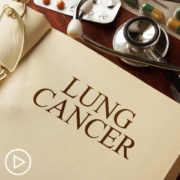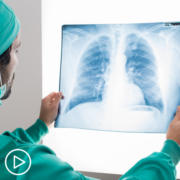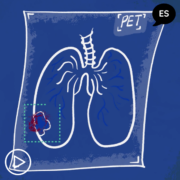How Should Newly Diagnosed Lung Cancer Patients Deal With Disease Stigma?
How Should Newly Diagnosed Lung Cancer Patients Deal with Disease Stigma? from Patient Empowerment Network on Vimeo.
How can lung cancer patients and advocates fight lung cancer stigma? Dr. Lecia Sequist shares her perspective about why a stigma has developed her advice for all people to start turning the tide against lung cancer stigma.
Dr. Sequist is program director of Cancer Early Detection & Diagnostics at Massachusetts General Hospital and also The Landry Family Professor of Medicine at Harvard Medical School.
[ACT]IVATION TIP:
“…spread the word about lung cancer. Whether or not you have lung cancer, maybe someone you know has lung cancer, but just tell people, lung cancer can happen to everyone, anyone. Lung cancer can happen if you smoked, if you never smoked, anything in between. Anyone who has lungs can get lung cancer.”
Download Resource Guide en español
See More from [ACT]IVATED NSCLC
Related Resources:
Transcript:
Lisa Hatfield:
Dr. Sequist, how should a newly diagnosed patient facing lung cancer respond in situations where they encounter lung cancer stigma? There’s a stigma that surrounds lung cancer sometimes. How would you recommend that they deal with that?
Dr. Lecia Sequist:
There’s this…in my opinion, there’s a stigma that surrounds lung cancer all the time, and it’s unfair. And I think if we look back, there were a lot of public awareness campaigns on TV and in magazines in the 1980s about quitting smoking, and you probably remember these ads, it showed people breaking cigarettes in half. And I think the intention of those was good, that they were trying to explain to the public that smoking could be harmful for your health, but it was just much too simplistic, because quitting smoking is really hard. It’s an addictive substance.
Nicotine is addictive, and it’s very…the way to treat addiction is usually not to just say, “Don’t do that, don’t do that.” There’s medically more sophisticated ways to treat addiction. But I think the flip side of that awareness campaign that smoking can be harmful for your health is it really ingrained in our culture this very deep-seated thought that if you choose to smoke, you’ve made a bad choice. And that’s just…it’s so problematic because most people didn’t choose to smoke, it was basically provided to them in these very complex and high-level targeted campaigns from the tobacco companies. And most people would like to choose to quit smoking if they are smokers, and they can’t because it’s an addiction, and it’s very challenging to quit. So basically, I think this is all to say the stigma around lung cancer comes from this misguided, false impression that a lot of Americans hold that lung cancer is because people made a bad choice to smoke or to not quit smoking.
And so it all comes together to make people think that those who get diagnosed with lung cancer did something wrong to deserve it, and that’s just not true. Nobody deserves to get cancer of any type. And lung cancer patients do suffer this unique blame that is not necessarily placed on other patients with other types of cancer, it’s really very unique to lung cancer. And it can be harmful for patients in many ways, it can be harmful in interpersonal interactions, but it also leads to policies and the whole way that our care system is set up that disadvantage lung cancer patients compared to other types of cancer patients. So there are a lot of people working hard on this problem, but something that you can do…
I guess my activation tip for this question would be to just spread the word about lung cancer. Whether or not you have lung cancer, maybe someone you know has lung cancer, but just tell people, lung cancer can happen to everyone, anyone. Lung cancer can happen if you smoked, if you never smoked, anything in between. Anyone who has lungs can get lung cancer. And we have to take the stigma away from this disease. Nobody deserves to have lung cancer. It’s not something that people cause to happen to themselves, and they certainly shouldn’t be blamed if they are finding themselves in a position where they have lung cancer. So just spreading the word, lung cancer can happen to anyone, anyone with lungs can get lung cancer, I think can help start to change the perceptions.
Share Your Feedback:
Create your own user feedback survey













